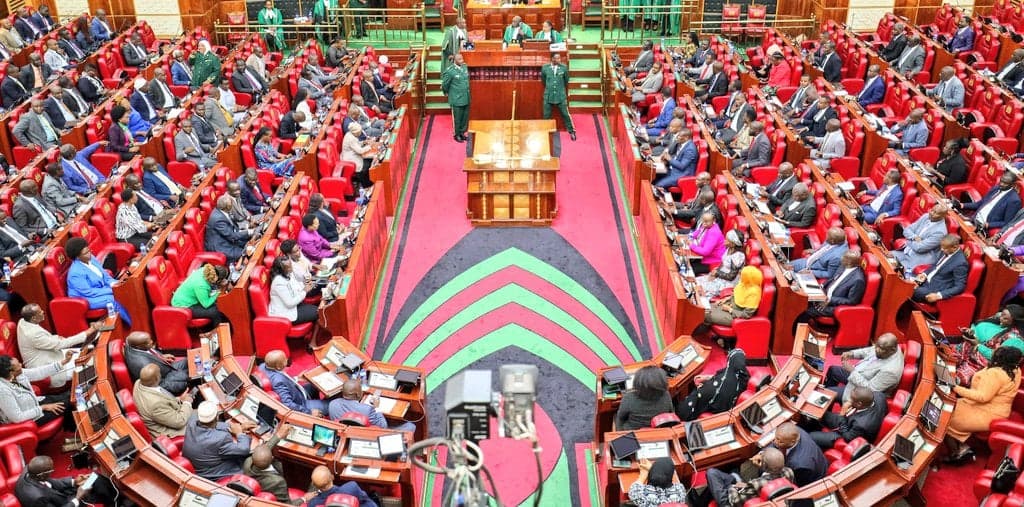We're loading the full news article for you. This includes the article content, images, author information, and related articles.
A new legislative proposal aims to streamline citizen engagement by allowing a single parliamentary house to lead consultations on concurrent bills, potentially saving taxpayers millions of shillings and making public feedback more impactful.

NAIROBI, Kenya – Members of Parliament have initiated a significant legislative overhaul to address the long-standing problems of duplicated, expensive, and often ineffective public participation in the law-making process. The Public Participation Bill, 2025, co-sponsored by Rarieda MP Dr. Otiende Amollo and Ainabkoi MP Samuel Chepkong'a, seeks to create a unified and cost-effective national framework for citizen engagement, a cornerstone of Kenya's 2010 Constitution.
The proposal directly confronts a critical inefficiency in Kenya's bicameral legislature. Currently, when a bill concerns both the National Assembly and the Senate, both houses often conduct separate and parallel public participation exercises, leading to a wasteful duplication of time, effort, and public funds. This redundancy has been flagged as a major drain on the exchequer, with individual forums estimated to cost between KSh 10 million and KSh 100 million.
The new bill, which was published on Tuesday, October 1, 2025, proposes a streamlined approach inspired by a suggestion from National Assembly Speaker Moses Wetang'ula. Under its provisions, the house that originates a bill or policy document would be responsible for conducting the primary public participation. The other house would then have the opportunity to provide its input based on the feedback gathered, thus eliminating the need for a second, redundant consultation process. This is enshrined in the bill's objective to ensure the "prudent and responsible" use of public resources.
The push for reform comes amid widespread criticism that public participation has become a tokenistic, 'compliance-only' exercise for many government bodies. A policy paper recently submitted to Parliament by Attorney General Justin Muturi highlighted that many state officers adopt a "minimalist approach" to engagement, with participation often happening at the tail end of a process, leaving little room for meaningful public influence. This has bred citizen apathy, with many Kenyans feeling their involvement does not genuinely impact final decisions.
The consequences of a poorly defined public participation framework have been stark. Numerous laws have faced lengthy and costly court challenges on the grounds of inadequate public consultation. The most high-profile example was the Supreme Court's finding that the Building Bridges Initiative (BBI) process fell short of the constitutional threshold for meaningful public participation. Such legal battles have delayed the implementation of key government policies, including the Social Health Insurance Act, which was initially halted by the High Court for similar reasons before the decision was reversed by the Court of Appeal.
Previous attempts to legislate a solution have faltered. Multiple public participation bills introduced since 2018 have failed to pass, often due to procedural delays and what has been described as "supremacy battles between the Senate and the National Assembly."
Beyond tackling duplication, the Public Participation Bill, 2025, aims to establish the country's first comprehensive legal standards for how citizens should be engaged by both national and county governments. A key provision mandates that responsible authorities must not only collect public submissions but also analyze them and publish the outcomes of the exercise. This creates a crucial feedback loop intended to restore public trust by demonstrating how citizen input was considered in the final policy or law.
The proposed law also includes strong inclusivity requirements. It mandates that all relevant documents be made publicly available and accessible. Furthermore, if participants are not fluent in English or Kiswahili, the engagement must be conducted in a language they understand, ensuring wider and more equitable participation. The framework explicitly requires authorities to listen to all stakeholders, with a focus on women, youth, persons with disabilities, and other marginalized communities.
The bill applies to all public participation exercises related to the formulation of policies and the enactment of laws at all levels of government. If passed by the National Assembly, it would represent a landmark step toward actualizing the constitutional promise of a government that is truly of, by, and for the people, moving beyond procedural compliance to foster genuine and impactful civic engagement.
Keep the conversation in one place—threads here stay linked to the story and in the forums.
Sign in to start a discussion
Start a conversation about this story and keep it linked here.
Other hot threads
E-sports and Gaming Community in Kenya
Active 9 months ago
The Role of Technology in Modern Agriculture (AgriTech)
Active 9 months ago
Popular Recreational Activities Across Counties
Active 9 months ago
Investing in Youth Sports Development Programs
Active 9 months ago
Key figures and persons of interest featured in this article